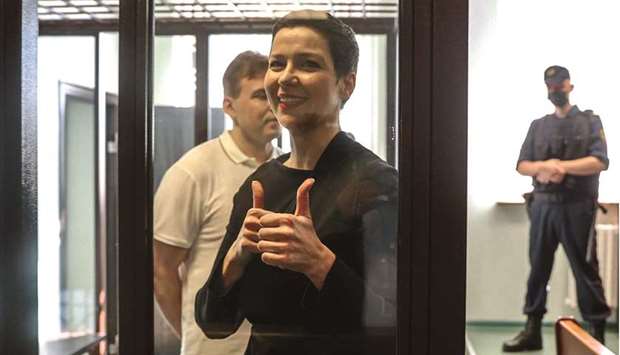• Maria Kolesnikova has been in custody since September after resisting a forced deportation by the KGB security service by ripping up her passport
Maria Kolesnikova, the last remaining protest leader still in Belarus, danced and smiled as she went on trial yesterday accused of violating national security when she challenged President Alexander Lukashenko’s rule last year.
Kolesnikova has been in custody since September, after resisting a forced deportation by the KGB security service by ripping up her passport.
In power since 1994, Lukashenko has been cracking down on opponents since unprecedented protests erupted after last year’s elections, deemed unfair by the West.
The start of the high-profile trial comes as critics accuse the Belarusian regime of killing an activist in neighbouring Ukraine and trying to forcibly bring an Olympic athlete home from Tokyo.
Kolesnikova, a 39-year-old former flute player in the country’s philharmonic orchestra, has become a symbol of the protest movement in Belarus.
Together with opposition leader Svetlana Tikhanovskaya and another campaign partner, Veronika Tsepkalo, Kolesnikova led last summer’s rallies against Lukashenko.
Yesterday, Kolesnikova and her lawyer Maxim Znak appeared at a closed court in the Belarusian capital.
The pair are accused of undermining national security, conspiring to seize power and creating an extremist group.
They face up to 12 years in prison if convicted.
In a video from inside the court, Kolesnikova — wearing a black dress and her signature red lipstick — was seen dancing and smiling next to Znak inside the defendant cage.
She also made a heart-shaped symbol with her hands, which she often did at protest rallies.
Kolesnikova’s Facebook page, run by supporters, said representatives from several embassies — including the UK and the US — came to the court. It posted a video of Kolesnikova’s father, who has not seen his daughter since her arrest but corresponds with her by post, thanking the diplomats.
She had written to him saying she will still “wear her favourite dress and irreplaceable lipstick” at the hearing, he said.
“I am motivated by the fact that she remains her bright self even in these conditions.”
Kolesnikova is the only protest leader still in Belarus.
Tikhanovskaya, who stood for president in place of her jailed husband, was forced out of the country and granted refuge in EU member Lithuania. Tsepkalo also left Belarus.
Together the three women inspired a wave of female protests in the country condemned by Amnesty International for its treatment of women activists. When Kolesnikova was arrested last September, members of the KGB put a sack over her head, pushed her into a minibus and drove her to the Ukraine border, she said. She jumped out of a car window and tore up her passport, refusing to leave the country. In a written interview with Russian TV channel Dozhd published yesterday, she said she did not regret the move, saying it showed “that the rumours about the all-powerful KGB are completely exaggerated.”
Neighbouring Ukraine said it would provide extra protection to the growing number of Belarusian exiles in the country after an activist was found hanged in a Kyiv park this week. Kolesnikova and Znak had previously worked for presidential hopeful Viktor Babaryko, who was sentenced to 14 years in prison on fraud charges last month.
They were both part of a seven-member Coordination Council, set up in response to the disputed August election to oversee the peaceful transition of power.
The opposition believes Tikhanovskaya was the real winner in the August vote.
She has urged the West to toughen sanctions against Lukashenko’s regime, and met with US President Joe Biden last week and British Prime Minister Boris Johnson on Tuesday.
According to local rights group Viasna, there are currently 603 political prisoners in Belarus.
Belarusian activist Vitaly Shishov was found hanged in a park in the Ukrainian capital Kyiv on Tuesday, with supporters accusing the regime of killing him. Belarusian sprinter Krystsina Tsimanouskaya said her team tried to forcibly send her back to the authoritarian country from the Tokyo Olympics on political orders. Yesterday, she flew out of Japan en route to Poland, which has granted her a humanitarian visa.

Maria Kolesnikova gestures inside the defendants’ cage at the opening of her trial in Minsk yesterday. (AFP)
